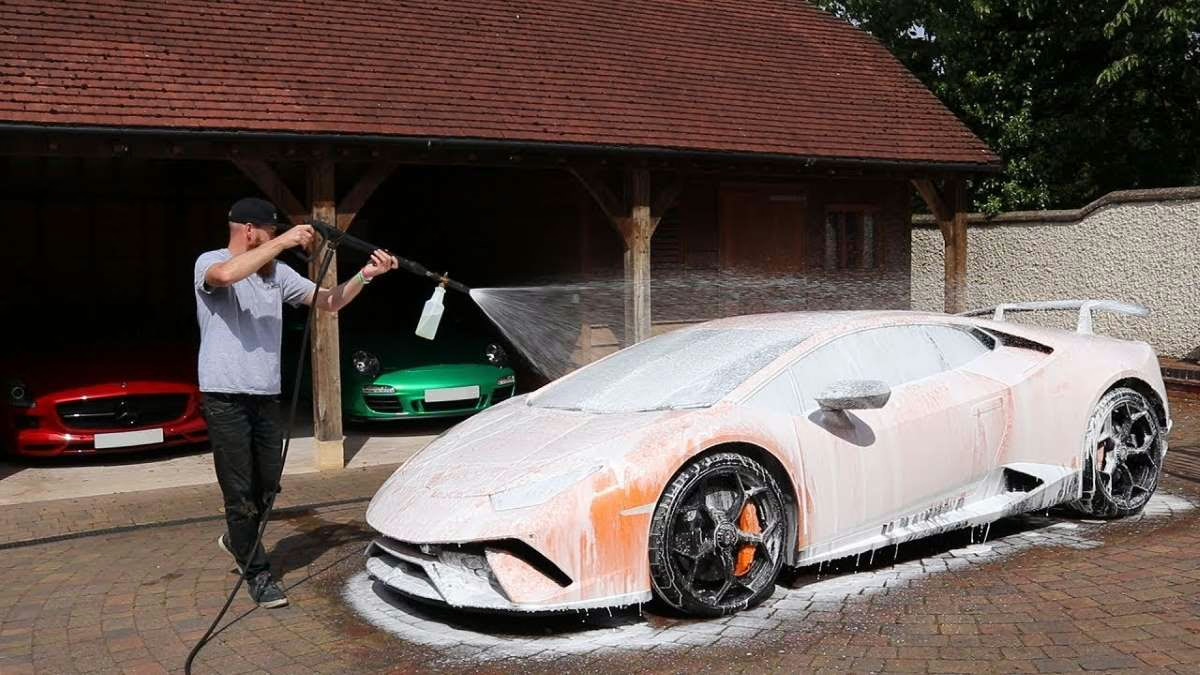Myths and misconceptions often surround car detailing. Many vehicle owners underestimate its significance, viewing it as a luxury reserved for special occasions or high-end cars. However, regular detailing is crucial in maintaining any vehicle’s health, longevity, and overall appearance. By debunking these car detailing myths, car owners can understand what truly matters in the detailing process and ensure their vehicle receives the care it deserves.
Let’s review these important tips and fact checks so we can properly detail our cars and show off the bling. ✨
Table of Contents
- The Importance of Quality Car Detailing
- Common Misconceptions About Car Detailing
- The Truth About DIY vs. Professional Detailing
- Key Components of Effective Car Detailing
- Choosing the Right Products for Your Vehicle
- Environmental Impacts of Car Detailing
- How Often Should You Detail Your Car?
- Summary
The Importance of Quality Car Detailing
High-quality car detailing is much more than a superficial cleaning job. It encompasses a meticulous process that enhances a vehicle’s interior and exterior. Detailing protects against contaminants such as dirt, acid rain, and UV rays, which can cause long-term damage to the car’s surfaces. A regular car detailing service helps to preserve the original factory finish, maximize resale value, and keep the car looking its best.
Many vehicle owners may not realize how detailing impacts driving safety and enjoyment. A clean vehicle provides a clearer road view, reduces potential distractions, and optimizes car features. Regular detailing removes allergens and ensures that interiors remain fresh, especially useful for driving long hours.
Common Car Detailing Myths
A prevalent misconception is that detailing is only necessary for a vehicle’s exterior. In addition, auto interior detailing is essential, ensuring the vehicle’s cabin remains clean, comfortable, and free from harmful particles. Detailing can prevent wear and tear on fabrics and extend the life of your car’s interior, enhancing the overall driving experience.
Another of the popular car detailing myths is that detailing is simply too costly or unnecessary. In reality, regular maintenance can save money over time by preventing the need for more extensive and expensive repairs or restorations. Detailing also enhances the lifespan and performance of all types of vehicles, whether they’re luxury cars, daily commuters, or weekend warriors.
The Truth About DIY vs. Professional Detailing
There is often a debate about whether DIY detailing measures up to professional services. DIY options fit within a budget and allow car owners to tackle basic cleaning tasks. However, professional detailers bring expertise, specialized tools, and advanced techniques that are difficult to match with at-home efforts.
Professional detailers often offer services like paint correction, which enhances the exterior finish by removing imperfections. They use high-grade equipment and products that provide deeper, clean, and longer-lasting protection than most DIY products can achieve. For those seeking the best care for their vehicles, professional detailing is an investment that yields significant returns through preserved value and optimal appearance.
Key Components of Effective Car Detailing
Effective car detailing includes various components that cater to the vehicle’s overall maintenance. Key elements include exterior cleaning, which involves washing, claying, and waxing to lift dirt and enhance the paint’s shine. Polishing is another crucial step, providing a deep cleanse that removes scratches and swirl marks.
Interior detailing focuses on shampooing carpets, treating upholstery, and cleaning nooks and crannies to ensure the cabin is free of dirt and allergens. Advanced services might include the application of protective treatments for seats and dashboards, keeping them looking new for longer. The detailing process addresses aesthetic concerns and supports a healthier and more enjoyable driving environment.

Choosing the Right Products for Your Vehicle
Choosing the right detailing products significantly impacts the outcome of the detailing process. High-quality products are gentle on the vehicle’s surfaces but tough on dirt and mildew. It’s essential to use products specifically designed for different parts of the car, be it the paint, chrome, or interior surfaces, to prevent damage and enhance efficiency.
With increasing sustainability awareness, eco-friendly products have gained popularity among car enthusiasts, which resolves one of the most common car detailing myths in the past 50 years. These products are formulated to be biodegradable and non-toxic, making them safe for use without compromising cleaning power. Vehicle owners can achieve superior detailing results by opting for trusted brands known for their effectiveness and environmental responsibility.
Environmental Impacts of Car Detailing
While car detailing is beneficial for maintaining vehicle condition, it’s crucial to account for the environmental impact it may have. Detailing can involve significant water use and lead to chemical runoff, which poses environmental concerns. Practicing sustainable methods, such as water-saving strategies and eco-friendly products, helps minimize these effects.
Responsible choices during detailing not only safeguard the environment but also improve the overall effectiveness of the detailing process. This includes using waterless wash products where suitable or opting for steam cleaning techniques that minimize water use. In doing so, car owners can enjoy the advantages of a pristine vehicle while contributing to broader ecological goals.
How Often Should You Detail Your Car?
The frequency of car detailing depends on various factors, including the car’s use, local environmental conditions, and owner preferences. It is recommended that a vehicle be detailed every four to six months to maintain its protective layers and overall appearance. However, more frequent detailing may be necessary in areas with higher pollution or adverse weather conditions.
Regular interior detailing is critical for those who frequently use their vehicle for work or travel with pets and children. Setting a consistent detailing schedule ensures minor issues are managed before they escalate, preserving the vehicle’s condition and market value over time.
Summary
Car detailing is integral in preserving vehicles’ exterior and interior quality. By debunking common misconceptions and understanding the benefits, car owners can appreciate the full advantages of regular detailing. Whether undertaking detailing tasks at home or seeking professional assistance, emphasizing quality, sustainability, and the appropriate frequency helps keep cars in prime condition for years.
Key Takeaways
- Car detailing is essential for vehicle maintenance, not just aesthetics.
- Several common car detailing myths can mislead vehicle owners.
- Using the right products and techniques is crucial for effective detailing.
- Professional detailing often provides more comprehensive care than DIY methods.
- Sustainable detailing practices help protect both the vehicle and the environment.
Through informed and regular maintenance, vehicle owners can enjoy a pristine, well-preserved vehicle that offers aesthetic pleasure and improved functionality and longevity. Embracing this holistic approach to car care ensures that your car remains a reliable and shiny part of your day-to-day life. Now that we have debunked these car detailing myths we can move forward with a new standard of excellence for our prized vehicles.
Read more: The Benefits of Regular Vehicle Maintenance

